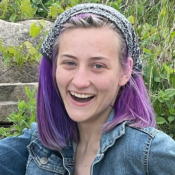
Speaker
Elise Fjelstad
Disability Activist; Undergraduate Student
Elise Fjelstad (she/her/hers) is a disabled queer literature-lover from Stoughton, Wisconsin, and a senior majoring in sociology and political science. She became engaged in disability activism at a young age, leading her to become involved in “The Future is Accessible” at UW and join the Disability Cultural Center Coalition. Through the internship program at Associated Students of Madison (ASM), Fjelstad started pushing for more comprehensive disability studies curricula at UW. She is also part of the LEND Fellowship at the Waisman Center, a writer and editor for The Badger Herald, and serves on the LGBTQ+ Committee through ASM.
Speaking in
The Evolution of Disability Justice
From the Civil Rights Movement of the 1960s to the Queer Liberation Movement and the modern Black Lives Matter movement, social movements are often perceived as single issues and associated with single groups of people. However, many scholars have long discussed essential concepts related to cross-movement organizing. As stated by philosopher Audre Lorde, “I am not free while any [person] is unfree, even when [their] shackles are different than my own.” Movements addressing trans liberation, economic inequality, protection of Black lives and ableism have always been interconnected. Throughout history, activists have recognized that we cannot fully dismantle one oppressive system without dismantling others.
In this presentation, a panel of UW–Madison undergraduate student activists will examine how the disability rights movement was historically interwoven with and reinforced by civil rights, queer and social welfare movements. From the 504 protests to the passage of the Americans with Disabilities Act, disabled queer people of color played crucial roles in advancing disability rights. Groups such as the Black Panthers and Street Transvestite Action Revolutionaries (STAR) publicly supported and advocated for the rights of disabled people despite being excluded from the mainstream movement. We will contrast the centering of white — often cisgender heterosexual — voices in the disability rights movement with a discussion of cross-movement solidarity in a disability justice framework pioneered by queer and trans disabled people of color. Attendees will learn how activists can and should implement cross-movement organizing and other disability justice principles into different social justice efforts here at UW.